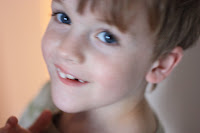Last Wedsday, Tim and I were lucky enough to attend an all-day event to hear Tony Attwood speak. He is one of the foremost experts on Asperger's Syndrome (AS) in the world. I got so much great information from the conference, and it seems that sharing this might help some of our friends and family "get" Zachary a little more.
The first thing that stuck out was that kids with AS are not comforted by affection in the way we "neurotypicals" expect. So, if he is physically hurt, a hug might not be want he wants or needs. If he is frustrated, comforting words and a kiss from mom aren't always the way to go. It's often best to leave him alone to work it out. This is HARD, believe me. My instinct is to scoop him up and try to make it better.
An encouraging analogy that he made was this: The difference between "classic" autism and an autism spectrum disorder like Asperger's is like the difference between blindness and needing glasses. We can HELP HIM LEARN to mitigate some of the negative effects of AS. (He also has a lot of strengths we can celebrate.)
Lots of the characteristics of AS are characteristics we see in many kids or many people, but they are taken to an extreme degree.
Kids with AS DO NOT LACK EMPATHY, but they do have a hard time reading the subtle signals that let us know that a response is expected. They are often around 2 years behind neurotypicals in friendship skills.
Ways AS brains are wired differently:
- Have trouble seeing another person's perspective
- have strong emotions but have a hard time understanding or expressing them
- are very oriented toward FACTS and data
- have sensory sensitivities (troubles with too much noise, action around them, etc)
- are rigid in their thinking
Axiety is common in people with AS. Short, intense, and GENUINE "attacks" of depression can happen. The child's "special interest" can become a "thought blocker" (or a way to deal with negative thoughts and anxieties).
AS kids are often chronically exhausted. They have spent the whole day at school using their intellect (instead of intuition as most kids are able to do) to sort out all of the social cues and things that are expected of them ON TOP OF the academic work. They need a safe haven to just be for a while.
A fear of failure and desire for perfection can happen because kids with AS perceive themselves more as adults and think they should be able to acheive as an adult does. We can help by showing that adults are not perfect and vocalize our thinking when we problem solve. We can model how to cope with frustration.
The "depth of Aspergers" (or ability to deal with emotions) can fluctuate from day to day INDEPENDENT of circumstances. We need to make SOME allowances for emotional bad days just as for physical illness.
Many times, negative emotions (sadness, frustrations, etc.) are expresses as anger. There is less of an ablity to articulate emotions.
In a meltdown:
1. Get rid of the other people (or face the person towards a wall)
2. Don't press for details right then
3. Remain calm yourself
4. Praise the child
5. Give them something to look forward to.
It's helpful if a person with AS can help someone else and feel needed.
So, that's some of the information I gleaned from the conference. Hope you find it helpful!
 Jeremy and I brought cupcakes to Zachary's classroom.
Jeremy and I brought cupcakes to Zachary's classroom.









 Later that day, we went to Grandma Hicks's house to celebrate. Zachary was so much fun. He LOVED all of his gifts. We he opened his dual action lightsaber, he immediately said to Jeremy, "You can use it for Halloween!" So sweet! Thankfully, he seemed to almost as excited about his new microscope as Jeremy and I were.
Later that day, we went to Grandma Hicks's house to celebrate. Zachary was so much fun. He LOVED all of his gifts. We he opened his dual action lightsaber, he immediately said to Jeremy, "You can use it for Halloween!" So sweet! Thankfully, he seemed to almost as excited about his new microscope as Jeremy and I were. 


